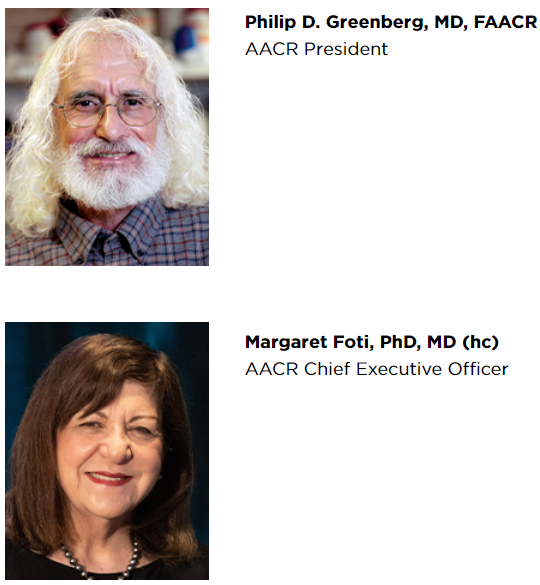
以下内容原文发布于AACR官网的AACR Cancer Progress Report, 中文内容仅做参考,请点击文末“阅读原文”,阅览原文内容。
《2023年AACR癌症治疗进展报告》已发布,点击“阅读原文”,前往AACR官网免费下载报告
我们正处在一个抗癌科学取得非凡进展的时代。在美国,癌症总死亡率持续下降,癌症幸存者人数创历史新高。癌症和医学各领域接连取得突破,针对晚期肺癌和转移性黑色素瘤这些过去的不治之症的治疗也取得了空前的进展。得益于新一轮的科学发现和技术创新,如今我们已准备好实现抗癌领域的变革性进展,挽救更多癌症患者的生命。
“AACR2023年癌症进展报告”全面概述了我们在医学研究方面取得的显著进展,其中大部分研究得到了美国国立卫生研究院(NIH)和国家癌症研究所(NCI)的联邦资金支持。正如报告中所强调的,(美国)联邦政府对医学研究的资助增进了我们对癌症复杂性的认识,加快了相关知识的转化,从而推动了更新、更好的癌症预防、检测、诊断、治疗和治愈手段的开发进程。
报告中详细介绍了2022年8月1日至2023年7月31日期间美国食品药品管理局(Food and Drug Administration,FDA)批准的14种新型抗癌疗法的进展情况。
这些新疗法中包括了首例获批的抗体药物偶联物(一种分子靶向疗法)产品,用于治疗携带特定生物标志物的卵巢癌患者。另一种获批的分子靶向疗法产品则堪称癌症医学领域的重大进展,针对人类癌症中最常见的突变基因之一—KRAS基因突变引起的蛋白质改变。通过数十年的实验室和临床研究积累,这一非凡的成就得以问世,该产品也是美国FDA批准的第二种同类药物。随着我们不断增进对癌症的分子、细胞机制的了解,未来还会有更多突破性的发现,并进一步推动精准癌症医学的发展。
正如报告中所展示的,得益于免疫学领域数十年的基础研究,癌症免疫疗法的影响迅速扩大,成为了癌症治疗的最新支柱,彻底改变了患者的治疗模式。免疫检查点抑制剂(immune checkpoint inhibitors,ICI)是一种免疫治疗药物,其原理是恢复免疫系统对癌症的天然杀伤力。截止2013年1月,仅有一种ICI药物获得FDA批准,用于治疗一种癌症类型。而到了2023年7月31日,获得美国FDA批准的ICI药物已达到11种,并且至少有一种ICI获批用于治疗多达20种不同类型的癌症以及携带特定分子特征或生物标志物的各种实体瘤类型。
CAR-T细胞免疫疗法目前已被批准用于多种血液系统癌症的治疗,其原理是通过对患者自身的免疫细胞进行基因工程改造,实现攻击患者癌细胞的目的,该方法也开创了个性化医疗的新时代。随着对免疫系统及其与癌细胞相互作用机制的深入了解,来自越来越多领域的专家将携手合作,为免疫疗法的开创性进展创造更多机遇,造福全球患者。
尽管在抗击癌症方面取得了如此多的重大进展,我们仍需寻找更新、更具革命性的方法来预防和治疗癌症,同时提高患者的生活质量。这一迫切需求源于癌症领域面临的严峻现实,估计2023年将有近200万美国人确诊癌症。由于癌症在很大程度上是一种老龄化疾病,而美国65岁及以上的老年人口正在不断增加,预计(癌症确诊人数)这一数字在未来几十年内还将大幅增加。因此,实施更新、更有效的癌症预防、早期检测、诊断和治疗策略至关重要。
了解更多内容,请阅读以下原文。
A MESSAGE FROM AACR
We are in an era of extraordinary scientific progress against cancer. In the United States, overall cancer death rates are continuing to decline, and the number of cancer survivors has reached a record high. Breakthroughs across the spectrum of cancer science and medicine are contributing to unparalleled advances against previously intractable diseases, such as advanced lung cancer and metastatic melanoma. Thanks to the new wave of scientific discoveries and technological innovation, we are now poised to deliver transformative advances that will save even more lives from cancer.
The AACR Cancer Progress Report 2023 provides a comprehensive overview of the remarkable progress we are making because of medical research, much of which is supported by federal investments in the National Institutes of Health (NIH) and the National Cancer Institute (NCI). As highlighted in the report, federal funding for medical research has enhanced our understanding of the complexities of cancer and accelerated the rate at which this knowledge is being harnessed to develop new and better approaches to preventing, detecting, diagnosing, treating, and curing cancer.
Among the advances detailed in the report are the 14 new anticancer therapeutics that were approved by the U.S. Food and Drug Administration (FDA) between August 1, 2022, and July 31, 2023.
Among the new treatments is the first antibody-drug conjugate, a type of molecularly targeted therapeutic, approved for treating patients with ovarian cancer harboring a specific biomarker. Another major advance in cancer medicine is the FDA approval of a molecularly targeted therapeutic specifically directed against the altered protein arising from a mutated KRAS gene, one of the most commonly mutated genes in human cancers. This remarkable achievement—the drug being only the second of its kind to receive FDA approval—was made possible by decades of laboratory and clinical research. As we continue to discover the molecular and cellular underpinnings of the collection of diseases we call cancer, there will be more groundbreaking discoveries that further advance the frontiers of precision cancer medicine.
As showcased in the report, decades of basic research in the field of immunology have led to a surge in the impact of cancer immunotherapy, the newest pillar of cancer treatment that has revolutionized patient care. The use of immune checkpoint inhibitors (ICI), which are immunotherapeutics that work by releasing brakes on the natural cancer-killing power of the immune system, has expanded at an unprecedented pace over the past decade. In January 2013, there was only one FDA- approved ICI for treating just one cancer type. As of July 31, 2023, there were 11 ICIs approved by FDA, and at least one ICI has been approved for treating 20 different types of cancer and any type of solid tumor characterized by the presence of specific molecular signatures, or biomarkers.
CAR T-cell-based immunotherapies, which are currently approved for an array of hematologic cancers, have ushered in a new era of personalized medicine because they are generated by the genetic engineering of a patient’s own immune cells to attack his or her cancer cells. Expanding our knowledge about the immune system and how it interacts with cancer cells, and facilitating the convergence of experts from an increasingly diverse array of disciplines, will create even more opportunities for pioneering advances in immunotherapy for the benefit of patients around the world.
Despite these significant strides against the disease, we must continue our quest for newer and more innovative methods to prevent and cure cancer while improving the quality of life of our patients. This urgent need is underscored by the sobering reality that nearly 2 million American will be diagnosed with cancer in 2023. This number is predicted to increase considerably in the coming decades because cancer is largely a disease of aging, and the segment of the U.S. population age 65 and older is growing. Therefore, it is critical to implement newer and more effective strategies for cancer prevention, early detection, diagnosis, and treatment.
Moving forward, we must also ensure that everyone benefits from the groundbreaking advances against cancer. As highlighted in this report, racial and ethnic minorities and other medically underserved populations shoulder a disproportionate burden of cancer. Participation of patients from these population groups in clinical trials that are testing lifesaving new anticancer therapeutics continues to be disappointingly low. We must adopt new approaches to inform, educate, and encourage cancer patients to enroll in clinical trials so that researchers can identify the most efficacious approaches to help all patients. As a scientific organization whose core values include diversity, equity, and inclusion, AACR is fiercely committed to addressing all inequities in cancer research and patient care and to ensuring sociodemographic diversity in the cancer workforce so that it is reflective of the patient population it serves.
Looking to the future, we strongly believe that we have never been in a better position to take lifesaving cancer science from the bench to the clinic. Thanks to bipartisan leadership in Congress that has delivered steady and significant annual funding increases for NIH and NCI, we now have the scientific knowledge, cutting-edge technologies, and capability to deliver unprecedented advances to all cancer patients. As the first and largest professional organization in the world dedicated to advancing all areas of cancer science and medicine, AACR is thrilled to work alongside the administration and complement the NCI’s National Cancer Plan to meet the goal of the reignited Cancer Moonshot of reducing the cancer death rate by at least half by 2047. To address the nation’s cancer mission and its challenges at the earliest possible time, AACR launched the AACR Cancer Centers Alliance on September 13, 2023. This formal partnership with the nation’s cancer centers will serve as a catalyst to marshal their resources and collaborate directly, effectively, and synergistically to propel new lifesaving cures for the millions of people whose lives are touched by cancer.
To maintain the momentum against cancer, we must ensure that medical research remains a national priority for our policymakers. Notably, the return on the federal investments in medical research has been extraordinary. For example, in the last 40 years, U.S. patients with cancer have collectively gained nearly 14 million years of life because of NCI-funded cancer research. Therefore, AACR urges Congress to continue to support robust, sustained, and predictable annual increases in the budgets of NIH and NCI, and to provide consistent and sufficient annual funding for the Cancer Moonshot, FDA, and Centers for Disease Control and Prevention (CDC). These actions will further advance the frontiers of cancer science and medicine and save more lives from cancer.

请点击“阅读原文”,前往AACR官网免费下载报告
排版编辑:肿瘤资讯-Astrid











 苏公网安备32059002004080号
苏公网安备32059002004080号


